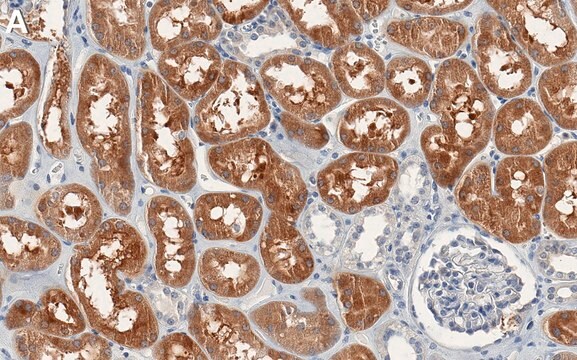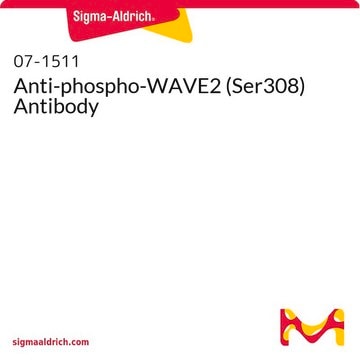07-1466
Anti-Cdc42 Antibody
from rabbit
Synonym(s):
G25K, GTP-binding Protein
Sign Into View Organizational & Contract Pricing
All Photos(1)
About This Item
UNSPSC Code:
12352203
eCl@ss:
32160702
NACRES:
NA.41
Recommended Products
biological source
rabbit
Quality Level
antibody form
purified antibody
antibody product type
primary antibodies
clone
polyclonal
species reactivity
mouse, human, rat
technique(s)
western blot: suitable
isotype
IgG
NCBI accession no.
UniProt accession no.
shipped in
wet ice
target post-translational modification
unmodified
Gene Information
human ... CDC42(998)
General description
cdc42 is a member of the Rho family of small GTP-binding proteins, and plays roles in cytoskeletal Actin organization as well as transformation. Rac is activated downstream of cdc42, or independently by Ras signaling, and in turn Rac stimulates Rho. Activation of cdc42 stimulates filopodia formation, whereas Rac results in the formation of lamellipodia, and Rho stimulates formation of actin stress fibers. Effectors of the cdc42/Rac pathway include NADPH Oxidase (Phox) and the SAPK1/JNK family of kinases. The latter pathway is activated by the PAK kinases, which are direct targets of cdc42.
Specificity
Recognizes Cdc42, does not cross react with Rac1. Cdc42 is a member of the Rho family of small GTPases. Small GTPases act as molecular switches in regulating a variety of biological response pathways by cycling from the GDP-bound (inactive) and GTP-bound (active) states. Cdc42 induces the formation of filopodia. Cdc42 can activate Rac (consequently, filopodia are intimately associated with lamellipodia.
Immunogen
Synthetic peptide corresponding to amino acids 130-141 of human Cdc42
(AKNKQKPITPET-C).
(AKNKQKPITPET-C).
Application
Research Category
Signaling
Signaling
Research Sub Category
MAP Kinases
MAP Kinases
This Anti-Cdc42 Antibody is validated for use in WB for the detection of Cdc42.
Western Blot Analysis: Rat brain with previous lots of rabbit anti-Cdc42 (cat. # 07-1466) and rabbit anti-Rac1 (cat. # 07-14664).
The molecular weights of Rac1 and Cdc42 are ~21 kDa.
Optimal working dilutions must be determined by end user.
The molecular weights of Rac1 and Cdc42 are ~21 kDa.
Optimal working dilutions must be determined by end user.
Quality
Routinely evaluated by Western Blot on rat brain lysates.
Western Blot Analysis: 1:500-1:2000 (0.5-2μg/mL) dilution of rat brain lysate with a previous lot of rabbit anti-Cdc42.
Western Blot Analysis: 1:500-1:2000 (0.5-2μg/mL) dilution of rat brain lysate with a previous lot of rabbit anti-Cdc42.
Target description
21 kDa
Linkage
Replaces: AB4201
Physical form
Affinity Purified
Format: Purified
Purified rabbit polyclonal IgG in 0.02 M PBS with 0.15 M NaCl, pH 7.6 and 0.1% sodium azide as a preservative.
Storage and Stability
Stable at 2-8°C in undiluted aliquots for up to 6 months from date of receipt.
Analysis Note
Control
Rat Brain Lysate
Rat Brain Lysate
Other Notes
Concentration: Please refer to the Certificate of Analysis for the lot-specific concentration.
Disclaimer
Unless otherwise stated in our catalog or other company documentation accompanying the product(s), our products are intended for research use only and are not to be used for any other purpose, which includes but is not limited to, unauthorized commercial uses, in vitro diagnostic uses, ex vivo or in vivo therapeutic uses or any type of consumption or application to humans or animals.
Not finding the right product?
Try our Product Selector Tool.
Storage Class Code
10 - Combustible liquids
WGK
WGK 2
Flash Point(F)
Not applicable
Flash Point(C)
Not applicable
Certificates of Analysis (COA)
Search for Certificates of Analysis (COA) by entering the products Lot/Batch Number. Lot and Batch Numbers can be found on a product’s label following the words ‘Lot’ or ‘Batch’.
Already Own This Product?
Find documentation for the products that you have recently purchased in the Document Library.
Amanda Amoah et al.
Haematologica (2021-01-15)
In this study, we characterize age-related phenotypes of human hematopoietic stem cells (HSCs). We report increased frequencies of HSC, HPC and lineage negative cells in the elderly but a decreased frequency of multi-lymphoid progenitors. Aged human HSCs further exhibited a
Shiri Gur-Cohen et al.
Nature medicine, 21(11), 1307-1317 (2015-10-13)
Retention of long-term repopulating hematopoietic stem cells (LT-HSCs) in the bone marrow is essential for hematopoiesis and for protection from myelotoxic injury. We report that signaling cascades that are traditionally viewed as coagulation related also control retention of endothelial protein
Edward O Kwarteng et al.
Journal of leukocyte biology, 103(3), 381-393 (2018-01-19)
The switch from fetal to adult hematopoietic stem/progenitor cells (HSPCs) is associated with profound changes in several genetic programs. Although HSPC ageing corresponds to alterations in Wnt signaling, relatively little is known about the relative roles of different Wnt signaling
Elodie Grockowiak et al.
Nature cancer, 4(8), 1193-1209 (2023-08-08)
Aging facilitates the expansion of hematopoietic stem cells (HSCs) carrying clonal hematopoiesis-related somatic mutations and the development of myeloid malignancies, such as myeloproliferative neoplasms (MPNs). While cooperating mutations can cause transformation, it is unclear whether distinct bone marrow (BM) HSC-niches
Tione Buranda et al.
Analytical biochemistry, 442(2), 149-157 (2013-08-10)
We describe a rapid assay for measuring the cellular activity of small guanine triphosphatases (GTPases) in response to a specific stimulus. Effector-functionalized beads are used to quantify in parallel multiple GTP-bound GTPases in the same cell lysate by flow cytometry.
Our team of scientists has experience in all areas of research including Life Science, Material Science, Chemical Synthesis, Chromatography, Analytical and many others.
Contact Technical Service








